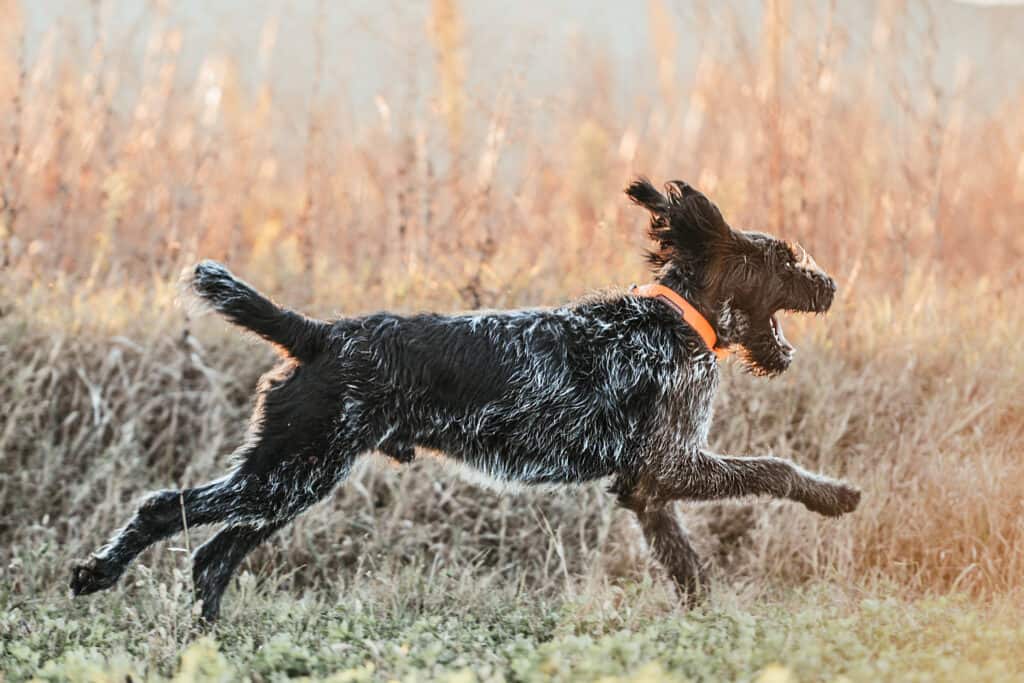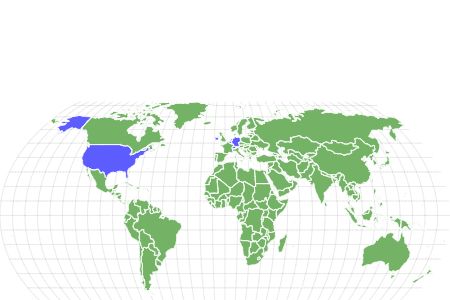German Wirehaired Pointer
Canis lupus
Advertisement
German Wirehaired Pointer Facts
- Favorite Food
- high protein
German Wirehaired Pointer Physical Characteristics
- Color
- Brown
- White
- White-Brown
- Grey-Brown
- Light-Brown
- Skin Type
- Fur
- Lifespan
- 12 — 14 years
- Weight
- 60 — 71 lbs.
- Height
- 22 — 27 inches
- Length
- 32 — 39 inches
- Age of Sexual Maturity
- 6 — 9 months
- Age of Weaning
- 5 — 6 months
- Venomous
- No
- Aggression
- Low
German Wirehaired Pointer as a Pet:
- General Health
- Energy Level
- Shedability
- Trainability
- Intelligence
- Tendency to Chew
- Size
- Family and kid friendliness
- Yappiness / Barking
- Moderate
- Separation Anxiety
- Moderate
- Preferred Temperature
- Cold climate
- Exercise Needs
- High
- Friendly With Other Dogs
- Moderate
- Pure bred cost to own
- $2,000
- Dog group
- Sporting
- Male weight
- 55-70 lbs
- Female weight
- -21-60 lbs
View all of the German Wirehaired Pointer images!
German wirehaired pointers were first bred in 19th century Germany as versatile, sturdy hunting dogs that could scent and retrieve no matter the climate. The breed is a blend of many different dog types, including the pudelpointer – an early hybrid of pointers and poodle types of dogs. German wirehaired pointers also carry genetics from bloodhounds and foxhounds, wirehaired pointing griffons, Polish water dogs, and others.
This cornucopia of DNA helped make German wirehaired pointers one of the most popular dogs in Germany, where it’s called the drahthaar. The breed arrived in the U.S. in the 1920s. While it has only achieved modest popularity in the states, German wirehaired pointers are much-beloved for their work-ready energy, extreme loyalty, and high intelligence.
Read on to learn more about the German wirehaired pointer, their temperaments, proper nutrition, and everything you need to consider before adopting one into your family.

The wiry German wirehaired pointer’s coat is weather-resistant and virtually water-repellent, allowing them to work in harsh conditions.
©iStock.com/Credit:Photographer and Illustrator
The Best Dog Food For German Wirehaired Pointer
German wirehaired pointers were bred for high-energy tasks and, if not adequately exercised are known to pile on weight. Their diets should contain high levels of proteins and vegetables, with a blend of healthy fats and vitamins, to provide optimal health. You should consult your veterinarian for exact measurements for your pup, which will vary based on factors such as age, weight, and activity level. On average, two measured meals per day will do the trick.
At A-Z-Animals, we recommend feeding your German wirehaired pointer with all-natural ingredient recipes and a blend of healthy fats, proteins, and vitamins. American Journey Salmon and Sweet Potato Recipe features salmon as the primary ingredient, which contains plentiful amino acids and omega-3s to support muscle growth and energy levels.
Always ensure fresh drinking water is available for your German wirehaired pointer, especially if you’re providing him with the proper high levels of exercise the breed requires.
Some pros and cons of owning a German Wirehaired Pointer
| Pros: | Cons: |
|---|---|
| Good for active owners These dogs can handle many adventures and terrains if you live a high-activity lifestyle. | Needs lots of exercise If you live a sedentary life, these dogs can pack on weight and become depressed. |
| Minimal grooming needs German Wirehaired Pointers stay clean and require little brushing. | Can be destructive when alone These dogs thrive in partnership and can become anxious and chew up your belongings if left to their own devices. |
| Exceedingly loyal With proper care and attention, these dogs will never leave your size. | Prey drive, due to hunting genetics Due to their strong hunting drive, they may track and “hunt” fellow pets. |
German Wirehaired Pointer Size and Weight
Adult male German Wirehaired Pointers are about 25 inches tall and weigh 70 lbs. in total weight. Females reach slightly shorter heights, up to 24 inches, and weigh a more trim 60 lbs. at maturity.
| Height (Male) | 25 inches tall |
| Height (Female) | 24 inches tall |
| Weight (male) | 70 lbs., fully grown |
| Weight (female) | 60 lbs., fully grown |
German Wirehaired Pointer Common Health Issues
The German Wirehaired Pointer is a generally healthy dog due to the broad range of genetics in their breeding history. However, there are a few conditions to watch out for, especially if you don’t acquire your dog from a reputable breeder. Some common health conditions in German Wirehaired Pointers include:
- Heart disease
- Hip dysplasia
- Seizures
- Gastric dilation-volvulus, which can be life-threatening
German Wirehaired Pointer Temperament
German wirehaired pointers are highly active pups, even-tempered, and extremely loyal to their families. They’re usually calm if adequately exercised, though they can be suspicious of strangers without proper socialization. Some individual dogs may try to dominate other dogs or animals and assert themselves as the alpha, though this can be rectified with appropriate training.
How To Take Care of German Wirehaired Pointer
Besides their need for extensive exercise, German wirehaired pointers are relatively low-maintenance dogs in terms of grooming and physical care. Consistent, positive-reinforcement training will help position owners as pack leaders. Once your German wirehaired pointer knows who’s in charge, they’ll be loyal and obedient companions for life.
Maintenance And Grooming
These dogs feature distinctively harsh and wiry outer coats that are all but waterproof, protecting from the harshest elements. Their wiry eyebrows, facial hair, and webbed feet protect them from mud or burrs and are easily kept clean. A gentle weekly brushing will keep your German wirehaired pointer in top shape and remove dead hairs.
Training
German wirehaired pointers thrive on outdoor activities such as long walks or hikes as high-energy sporting dogs. Exercise and mental stimulation through learning new tricks, play-hunting, or agility games go a long way to keeping your pup happy and healthy. These dogs can learn various tricks and enjoy participating in obedience, tracking, rally, or other competitive activities.
Exercise
German wirehaired pointers require vigorous exercise every day. They’re best suited for families with larger yards through which these high energy dogs can run and play. Water or fetch activities are also good ways to help burn excess energy. Without the proper amount of exercise and stimulation, German wirehaired pointers can become distressed, restless, and destructive.
Puppies
German wire-haired pointers’ litters usually produce six to ten puppies. They’re brilliant puppies, so early training and socialization will help them understand pack dynamics and enjoy structure in their new families. A patient, gentle trainer is best suited to puppies of this breed.
German Wirehaired Pointer And Children
German wirehaired pointers do best with older children who know how to treat dogs respectfully. They also do well if raised with younger children, but it’s recommended to supervise your child when interacting with your dog. They may be cautious around strangers’ children, so take care to teach kids how to gently and respectfully handle dogs properly.
Dogs similar to German Wirehaired Pointer
The German wirehaired pointer is closely related to the similar German shorthaired pointer, the pudelpointer (its ancestor), and the Slovakian wirehaired pointer.
- German shorthaired pointers: These dogs share a look and several traits with the German wirehaired pointer, but their coats are shorter and lighter.
- Pudelpointer: Descended from the poodle and the pointer, this pup also is a great swimmer and hunter.
- Slovakian wirehaired pointer: This dog is very similar to its German counterparts, except it originated in Slovakia after World War II.
Popular Names for German Wirehaired Pointer
Popular names for German Wirehaired Pointer dogs include:
- Truman
- Freddie
- Diesel
- Steffi
- Ember
- Edie
- Adele
Related Animals:
View all 170 animals that start with GGerman Wirehaired Pointer FAQs (Frequently Asked Questions)
How much does German Wirehaired Pointer cost to own?
German Wirehaired Pointers are common dogs, sometimes available in local shelters or rescues. Otherwise, puppies from reputable breeders can cost anywhere from $800 to $2,000, depending on their lineage and any AKC registrations.
Is German Wirehaired Pointer a good family dog?
German Wirehaired Pointers do well with older or younger kids as long as they are raised with them as puppies. They may be too high energy and exuberant for young children.
Does German Wirehaired Pointer shed?
These dogs’ wiry, thick coats require minimal grooming and only lightly shed year-round.
How long does a German Wirehaired Pointer live?
German Wirehaired Pointers are generally healthy and live the average lifespan of a medium-to-large-sized dog of 12 to 14 years.
Are Wirehaired Pointers aggressive?
These dogs are not aggressive with people, usually. German Wirehaired Pointers can be aggressive toward other animals if they’re not properly socialized early in their training. Their hunting instinct may kick in if they see a neighborhood cat or squirrel running by, prompting them to give chase.
Thank you for reading! Have some feedback for us? Contact the AZ Animals editorial team.
Sources
- American Kennel Club, Available here: https://www.akc.org/dog-breeds/german-wirehaired-pointer/
- German Wirehaired Pointer Club of America, Available here: https://gwpca.com/
- Adopt-a-Pet, Available here: https://www.adoptapet.com/s/adopt-a-german-wirehaired-pointer

















